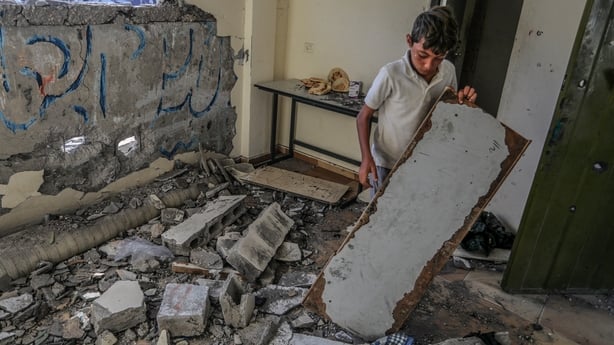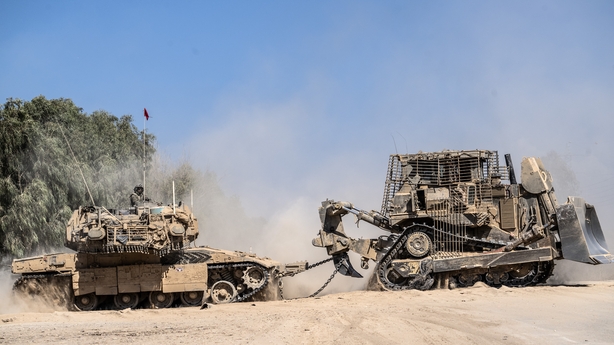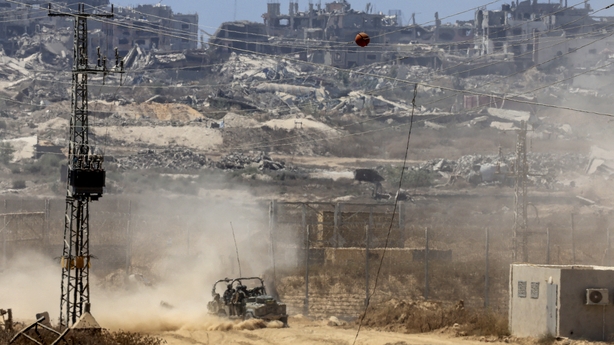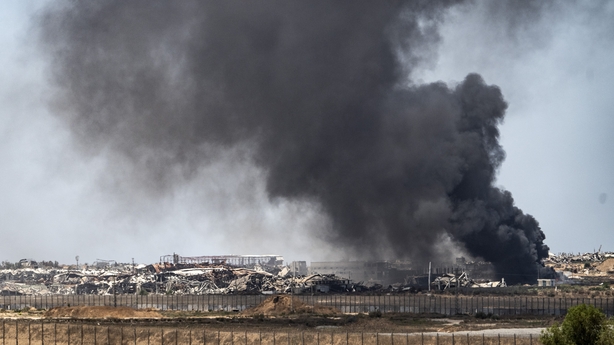A top Hamas official has said that "intensifying" Israeli military operations in Gaza would harden the Palestinian group's negotiating position in mediation efforts towards a truce.
In recent days, Israeli forces have increased raids in northern Gaza as heavy fighting again raged in the far-southern city of Rafah.
Across the besieged territory, deadly strikes have hit four schools used as shelters, sparking rebuke from France and Germany which both labelled the attacks "unacceptable".
Hamas official Hossam Badran, asked about the increased military operations, told AFP that Israel "is trying to pressure negotiations by intensifying bombing operations, displacement, and committing massacres".
As long-stalled diplomatic efforts have gathered pace, aiming for a hostage release deal and Gaza truce after more than nine months of devastating war, Mr Badran said Israel was trying to force Hamas's hands.

According to Mr Badran, the Israeli government was "hoping that the resistance will relinquish its legitimate demands", which include a complete ceasefire and full withdrawal of Israeli troops from Gaza.
But "the continuation of massacres compels us to adhere to our demands", he said.
On Sunday, a Hamas official told AFP on condition of anonymity that the group was ready to discuss a hostage release deal with Israel even without a "complete" ceasefire.
But now, Mr Badran said: "we cannot determine to what extent the negotiations can proceed despite the flexibility we have shown."
Truce negotiations, mediated by Qatar and Egypt with US support, are due to resume in Doha today.
Hamas's political leader, Ismail Haniyeh, warned on Monday that Israel's latest offensive in Gaza City and Rafah risked sending back "the negotiating process to square one".
The war began with Hamas's 7 October attack on southern Israel that resulted in the deaths of 1,195 people, mostly civilians, according to an AFP tally based on Israeli figures.
The militants also seized 251 hostages, 116 of whom remain in Gaza, including 42 the military says are dead.
Israel responded with a military offensive that has killed at least 38,295 people in Gaza, also mostly civilians, according to figures from the Hamas-run territory's health ministry.

The Israeli army has dropped thousands of leaflets on Gaza City urging all residents to leave amid an intensified military offensive on the Palestinian territory's main city, an AFP journalist said.
The leaflets, addressed to "everyone in Gaza City", set out routes out of the city to designated safe areas further south and warned the urban area would "remain a dangerous combat zone" as the army hits Hamas targets.
Israel issued a first formal evacuation order for part of the city on 27 June, and two more in following days.
In the leaflet drop, the army said residents would be able to take two safe roads "quickly and without inspection from Gaza City to shelters in Deir Al-Balah and Al-Zawiya".

Following the 7 October Hamas attacks, Israel said in January that it had "dismantled" the militant group's "military structure" in the northern city.
Tens of thousands more residents have already fled Gaza City since troops launched the latest offensive in the city's eastern Shujaiya district and ground battles have since raged.
The two latest orders covered central and western districts where tanks and troops have move in this week.
The army also said its forces had attacked militants inside Gaza City's vacated headquarters of the UN agency for Palestinians, UNRWA.
Strikes have also hit Deir Al-Balah, an area where Palestinians have been urged to move to for safety.
The United Nations yesterday expressed alarm at Israel's evacuation orders, saying they tell Palestinians to go to zones where there is fighting.
The Israeli army has also said it was reviewing an attack yesterday in which hospital sources said at least 29 people were killed in a nearby school in the southern Khan Younis area - the fourth attack on a school building in four days.
The Israeli military said that one overnight attack in Gaza City targeted Hamas and Islamic Jihad targets operating from inside UNRWA headquarters.

The UN agency has not had control of the building since October. Israeli forces said in February they had found a Hamas tunnel underneath the headquarters.
The military said the militants were "operating inside UNRWA's headquarters in the area and using it as a base to conduct attacks on Israeli Defence Forces troops in the central Gaza Strip".
It said that militants had been "eliminated" and "large amounts of weapons" found.
UNRWA has said it has "no way to verify" claims that its facilities are being used by Hamas and its allies.
Meanwhile, yesterday's deadly strike near the Al-Awda school in Abasan, near Khan Younis, brought new condemnation from Hamas over the Israeli military tactics.
We need your consent to load this rte-player contentWe use rte-player to manage extra content that can set cookies on your device and collect data about your activity. Please review their details and accept them to load the content.Manage Preferences
The Hamas government said a "majority" of the dead were women and children.
The Israeli military said the air force had "struck a terrorist from Hamas' military wing who took part, among other terrorist activities, in the 7 October brutal massacre" in southern Israel.
It was the fourth time in four days that Gaza school buildings sheltering the displaced had been hit.
More than 38,000 people have been killed in Gaza since the start of the war, health officials in the Hamas-run territory said.
The war erupted when militants led by Hamas infiltrated southern Israel on 7 October, killing 1,200 people and taking around 250 hostages back to Gaza, according to Israeli figures.

